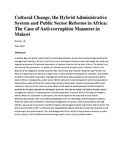| dc.description.abstract | A decade ago, this author noted that the hybrid administrative system had created a huge dilemma for management training in Africa, in that there was a discrepancy between what was taught and what was happening because of wholesale importation of western theories into an alien culture. This article is an extension of this perception, to explain the dismal outcomes of public sector reforms in Africa. The absence of an indigenous entrepreneurial class, and human and material resources have 'forced' the state at independence to become a major actor in socio-economic
development. However, new brands of reforms that call for new public management techniques have questioned the size and role of the state in Africa. Consequently, public sector reforms aimed at modernizing public sector bureaucracy to improve the quality of life of the citizens have become fashionable. Despite tremendous efforts and resources, many countries have not come close to their goals of developing and transforming their societies to the same standard as developed countries. How do we explain the failure of public sector management reforms in achieving their intended objectives in most of Africa? Focusing on Malawi's reform efforts to crackdown on corruption, this article explores the view that it is the hybrid administrative system that is an additional explanation
for the challenges confronting some reforms. While we have been successful in importing management structures, rules and procedures through reforms, we are yet to succeed in transforming the cultural aspects which make these reforms work. The article recommends a shift in individual and organizational values, attitudes, beliefs and practices at the bureaucratic and political levels. The central argument of the article is that positive outcomes in public sector reforms in Africa will be achieved through public sector culture transformation. | en |

